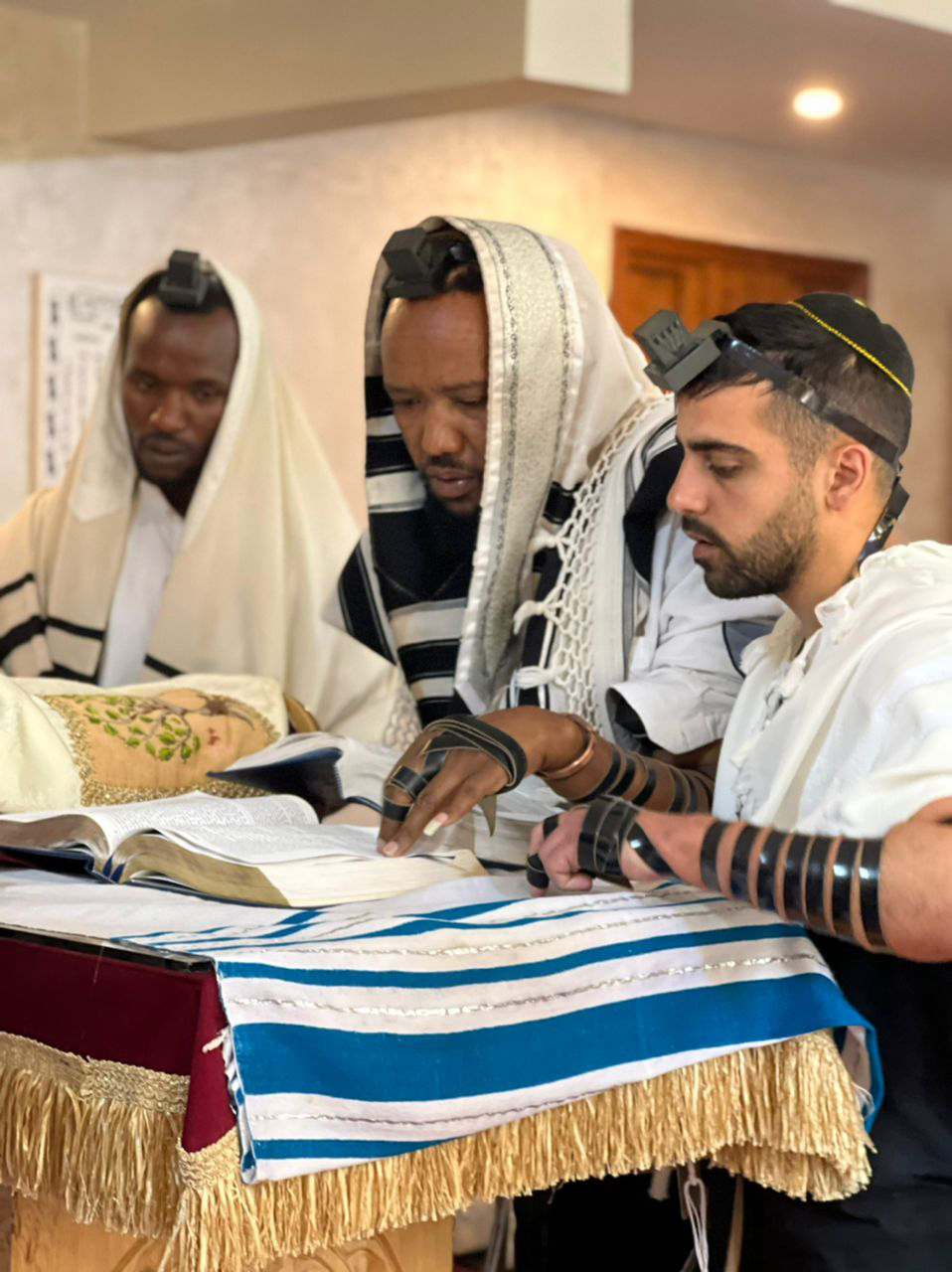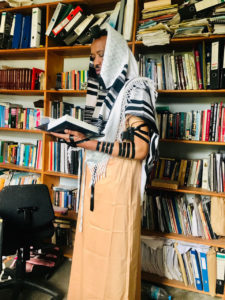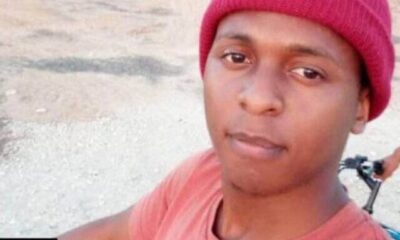
World

The Tanzanian Jews who know Torah laws by heart
Yehudah Amir Kahalani keeps kosher, is shomrei Shabbos, and goes to shul. His community has a mikveh, practices brit milah, and teaches their children Jewish history. His knowledge of Jewish law and Torah could rival that of a religious Jew anywhere in the world. Yet he heads up a tiny Jewish community in Arusha, Tanzania, where every day, he ensures that the deep but forgotten Jewish history of the region continues.
Speaking to the SA Jewish Report wrapped in a tallis, Kahalani explains that he’s just returned from South Africa, where his daughter was registering to go on an Israel programme. For him and his community, her going to Israel will strengthen ties that were broken and lost long ago.
“The South African Jewish community is wonderful,” he says. “You may not have electricity, but to have a kosher deli on every corner is incredible!” He says he has found the community to be welcoming and supportive.
Jews came to Tanzania from other places, he says, including Yemen, Oman and Ethiopia. Many settled there because they were traders. His own family came from Yemen, and he was born in Zanzibar. “Judaism flourished. There were many synagogues, which have now been turned into mosques. The rise in Islam didn’t affect Jews in the area for many years.” In fact, Jews in Tanzania and Zanzibar were persecuted more by Christians than Muslims.
But in the 1960s, things began to change, especially after the Six Day War in 1967. “Jews started to leave, and Jewish activities were banned. Jews owned a lot of property but then property was nationalised. This forced many to leave.”
Kahalani’s family was one of those that fled, becoming wandering Jews. “My parents tried to settle in Yemen. Then we moved to Kenya. We came back to Tanzania, then Kenya again,” he says. They had to hide their Judaism, but at the same time, “I learned Torah very young. I learned about shechita when I was three, and could do it when I was seven. I was reading the Torah at three years of age. We learned the tefillin without using siddurim. We learned all the laws by heart.”
The family eventually went back to Tanzania. “Lots of Jews continued to hide their Judaism. My father wanted us to hide it, but he said that one day, we would have a president who loves Israel, and at that time, we must [be] open about being Jewish.”
That prophecy came true in 2015, when Tanzanian President John Magufuli publicly announced his love for Israel. “He immediately opened an embassy in Tel Aviv, encouraged Israelis to come to Tanzania, and decreed that if there were any Jews in Tanzania, they should be free to practice. From that day, we felt liberated once again, but others still aren’t convinced and remain in hiding.”
Ari Greenspan and Ari Zivotofsky wrote about meeting Kahalani in the Mispacha Jewish Family Weekly online magazine in February 2020. “Yehudah is a successful, well-connected lawyer, as well as a lecturer at Mount Meru University. His engaging, friendly and modest demeanour makes it easy to see why people like him. He told us that he often appears in court where one is obligated to uncover his head, yet a Muslim judge was sympathetic to his hesitation and permitted him to wear a yarmulke, which he now proudly dons in court. He’s not shy about walking around town with his yarmulke and tzitzis.

“As we listened to him relate halachos, midrashim and Jewish tales, it was hard to believe that this man in his 40s never had any kind of formal Jewish education and never lived in a normative community. It was like we had stumbled upon a Jewish Robinson Crusoe. All of his Jewish knowledge was from his revered father and grandfather.”
The community still faces many challenges. For example, a Christian missionary organisation has a page on its website about the Jews of Tanzania and how to convert them.
In spite of this, Kahalani continues to head up his small congregation. “There are about 500 Jews in Tanzania. In Arusha, there are about 80 to 100 who aren’t very religious. About 40 people are very religious,” he says.
His community always prioritised Jewish education, no matter the circumstances, he says, pointing out that “this saved us”. He says they have one sefer Torah. “We used to have 12. Three were written by my great-grandfather. But we don’t know where they are now.”
How they came to possess this Torah scroll is an amazing story in and of itself. In 2016, Rabbi Eytan Kenter of Kehillat Beth Israel in Ottawa, Canada inherited a number of Torah scrolls when a number of shuls merged together. “Long story short, we found that we were in possession of 34 Torah scrolls,” Rabbi Kenter told The Jewish Standard in 2019. A sofer (scribe)Rabbi Moshe Druin, asked what he planned to do with them, to which Kenter said he would love to find emerging Jewish communities that couldn’t afford to buy their own Torah, and donate them. About eight weeks later, Rabbi Druin got an email from a man in Tanzania who was looking for a Torah scroll for his community.

That man was Kahalani. Rabbi Kenter decided to give a sefer Torah — repaired, made kosher, and ready for use — to the Jews of Arusha. His board agreed. “You can’t dispose of an asset without approval, and we got overwhelming approval,” he says.
But “you can’t just FedEx a Torah”, Rabbi Kenter says. “And we wanted to develop a relationship with the community we were giving it to.” So, he assembled a group of people to take the Torah to Tanzania. It even got its own seat on the many flights it took to get there.
The handing over of the Torah was highly emotional for all involved. “The way he held it when we gave it to him — it was like when you have a new-born child,” says the rabbi. “It’s joy — and also panic. His smile is humongous, but he’s also clutching the Torah with both hands, like he’s afraid he’ll drop it. When he went home, he didn’t want to put it down. Everyone was crying. We were all super-emotional about this moment of transition.”
Though Kahalani knows that some halachic authorities may question his Jewishness, he says, “My grandfather and father told me I must never try prove that I’m part of am Yisrael. I only have to prove it to Hashem, by keeping the mitzvot.”
He and his wife, Efrat, and their three daughters, maintain a kosher home, which is a real undertaking in Tanzania. Many products in their kitchen are imported from South Africa and certified by the South African Beth Din.
To the South African Jewish community, he says he would like to build bridges and strengthen connections. “Judaism is like one tree with so many branches. If any branch gets cut off the tree, the whole tree feels the pain. We mustn’t just practice Judaism, but put Judaism into practice.”







Susan Weil
July 27, 2022 at 4:12 pm
Amazing. Wonderful to read.
Yehudah Kahalani
August 12, 2022 at 10:21 am
This is absolutely Amazing thanks for this wonderful and classic article
Casto
July 6, 2024 at 6:31 pm
HaShem bless you man. I am a lover of Israel. I like to know more about Judaism.
Efrat Yosef
August 18, 2022 at 9:33 pm
Superb article, everything captured in its reality
Raheli Kuperman
October 19, 2022 at 7:02 am
This is amazing.
We will be visiting Tanzania soon from Israel.
Would be happy to visit the kahalani family.
How can we contact them?